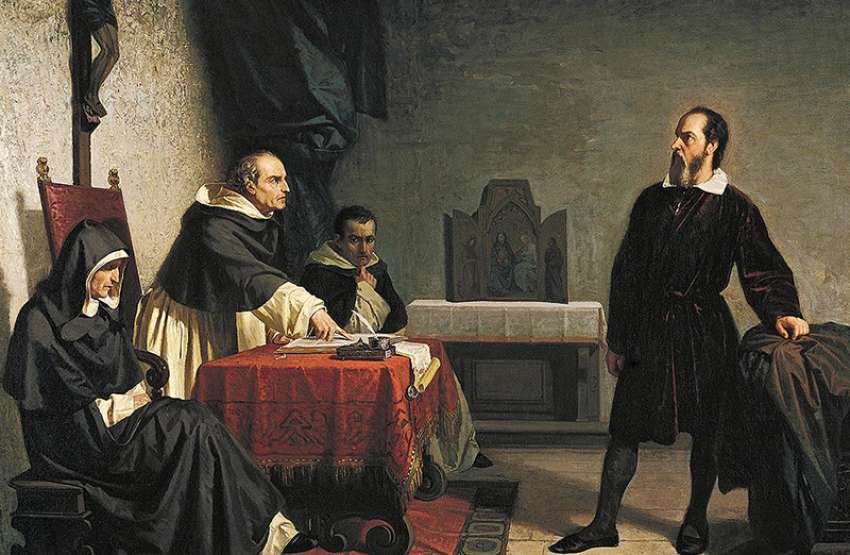Galileo facing the Roman Inquisition, painting by Cristiano Banti, 1857. Ever since St. Pope John Paul II launched a 13-year review of the Galileo trial in 1979, ending in a sweeping correction of Catholic attitudes about both Galileo and science in general in 1992, the Catholic conversation about faith and science has quietly charted a new and fruitful path.
Wikimedia Commons
Forum fights back against notions of incompatibility of science and faith
By Michael Swan, The Catholic Register
When Governor General Julie Payette rolled her eyes and asked a room full of scientifically literate people whether they could believe there still are people “questioning whether life was a divine intervention,” she got the laugh she was looking for.
The fact that Payette’s audience at the Canadian Science Policy Conference Nov. 1 was on the same page with her doesn’t surprise University of Toronto physics student Darren Pereira, who helps organize the Genesis Faith and Science Forum at U of T’s Newman Centre.
“It’s become a sort of popular narrative that the two (faith and science) are incompatible,” Pereira told The Catholic Register.
The assumption that faith opposes science isn’t just widespread, it fuels a highly polarized environment, said the young Catholic science student.
“I rarely see online debates where there’s a strong, rational discussion between the two sides,” he said. “A lot of the time, what I see is extremists on either side.”
Pereira and his friends at the Genesis Faith and Science Forum work to promote the idea that science and faith are better together. The group, which includes scientists and non-scientists from a variety of faiths — and even those of no faith — meets every couple of weeks through the academic year on the downtown university campus.
The Genesis Forum has two public lectures scheduled to advance rational dialogue about science and faith. “The Catholic Perspective on Evolution” on Jan. 25 will feature Dominican scientist and co-author of Thomistic Evolution, Fr. Thomas Davenport, at the Newman Centre. A March 8 lecture by science writer Stacy Trasancos will look at The Role of Christianity in the Development of Modern Science.
St. Mark’s College at the University of British Columbia is also bringing an example of scientifically literate faith to campus with a Nov. 22 lecture by Jesuit astronomer Br. Guy Consolmagno, director of the Vatican Observatory.
At the University of Alberta’s Catholic college, St. Joseph’s, associate professor Denis Lamoureux holds the distinction of holding the first tenure track position in science and religion at any Canadian university. The Evangelical Christian, who was raised Catholic and holds PhDs in evolutionary biology and theology, sees Payette’s remarks as “just a function of secularization.”
“I used to hold the very same views as Julie Payette, but let me tell you I was totally and completely socially conditioned into such a view,” he said. “I can forgive an undergraduate for having those views, but I expect a little bit more from our Governor General.”
Lamoreux attributes the Payette understanding of religion as opposing science to a hangover from early 20th-century modernism.
“This is modernity, basically out of the 1940s. Her grasp is a 1940s grasp of knowledge,” he said.
In a post-modern world, we have to “get away from this simplistic idea that science solves all problems, that science is ubiquitous in its knowledge,” said Lamoureux. “I, for one, find that academically vacuous and personally insulting.”
This fall Lamoureux has launched an open, online course in science and religion on the giant coursera.org website for online university courses.
Ever since St. Pope John Paul II launched a 13-year review of the Galileo trial in 1979, ending in a sweeping correction of Catholic attitudes about both Galileo and science in general in 1992, the Catholic conversation about faith and science has quietly charted a new and fruitful path, said Lamoureux. Catholics now have a scientifically literate Pope who studied chemistry and worked as a chemist before he entered the Jesuits.
“Science expresses its full dignity when it serves the integral development of the person and the human family,” the Pope tweeted on his @Pontifex account Nov. 10.
Even on subjects like the Big Bang Theory of creation, the Pope has found common ground.
“The Big Bang, that is placed today at the origin of the world, does not contradict the divine intervention but exacts it,” Francis said in 2014. “The evolution in nature is not opposed to the notion of creation, because evolution pre-supposes the creation of beings that evolve.”
On the other hand, popular Evangelical and Pentecostal movements in the United States continue to put their money and media empires behind literalist, fundamentalist readings of the Bible, claiming evolution is impossible and the Earth is just 6,000 years old. The Creation Museum in Kentucky refers to the Bible as the “the history book of the universe.”
While faculty at Evangelical universities and a few others have begun to walk away from “young-Earth creationism,” at the grassroots the creationist Evangelicals continue to promote positions that make easy targets for anti-religious science commenters.
“But if you go to their colleges, you will find the dominant position is that they’re embracing science, in particular evolution, fully,” Lamoureux said.
Please support The Catholic Register
Unlike many media companies, The Catholic Register has never charged readers for access to the news and information on our website. We want to keep our award-winning journalism as widely available as possible. But we need your help.
For more than 125 years, The Register has been a trusted source of faith-based journalism. By making even a small donation you help ensure our future as an important voice in the Catholic Church. If you support the mission of Catholic journalism, please donate today. Thank you.
DONATE

